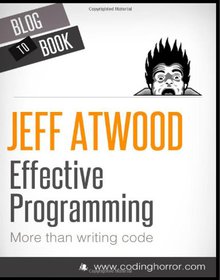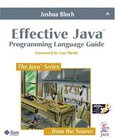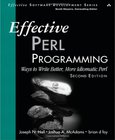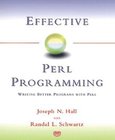Effective Programming
More Than Writing Code

Book Details:
| Publisher: | CreateSpace Independent Publishing Platform |
| Series: | CreateSpace , Effective |
| Author: | Jeff Atwood |
| Edition: | 1 |
| ISBN-10: | 147830054X |
| ISBN-13: | 9781478300540 |
| Pages: | 278 |
| Published: | Jul 04 2012 |
| Posted: | Nov 19 2014 |
| Language: | English |
| Book format: | |
| Book size: | 5.61 MB |
Book Description:
ABOUT THE BOOK Jeff Atwood began the Coding Horror blog in 2004, and is convinced that it changed his life. He needed a way to keep track of software development over time - whatever he was thinking about or working on. He researched subjects he found interesting, then documented his research with a public blog post, which he could easily find and refer to later. Over time, increasing numbers of blog visitors found the posts helpful, relevant and interesting. Now, approximately 100,000 readers visit the blog per day and nearly as many comment and interact on the site. Effective Programming: More Than Writing Code is your one-stop shop for all things programming. Jeff writes with humor and understanding, allowing for both seasoned programmers and newbies to appreciate the depth of his research. From such posts as "The Programmer's Bill of Rights" and "Why Cant Programmers... Program?" to "Working With the Chaos Monkey," this book introduces the importance of writing responsible code, the logistics involved, and how people should view it more as a lifestyle than a career. TABLE OF CONTENTS - Introduction - The Art of Getting Shit Done - Principles of Good Programming - Hiring Programmers the Right Way - Getting Your Team to Work Together - The Batcave: Effective Workspaces for Programmers - Designing With the User in Mind - Security Basics: Protecting Your Users' Data - Testing Your Code, So it Doesn't Suck More Than it Has To - Building, Managing and Benefiting from a Community - Marketing Weasels and How Not to Be One - Keeping Your Priorities Straight EXCERPT FROM THE BOOK As a software developer, you are your own worst enemy. The sooner you realize that, the better off you'll be.I know you have the best of intentions. We all do. We're software developers; we love writing code. It's what we do. We never met a problem we couldn't solve with some duct tape, a jury-rigged coat hanger and a pinch of code. But Wil Shipley argues that we should rein in our natural tendencies to write lots of code: The fundamental nature of coding is that our task, as programmers, is to recognize that every decision we make is a trade-off. To be a master programmer is to understand the nature of these trade-offs, and be conscious of them in everything we write.In coding, you have many dimensions in which you can rate code: Brevity of codeFeaturefulnessSpeed of executionTime spent codingRobustnessFlexibility Now, remember, these dimensions are all in opposition to one another. You can spend three days writing a routine which is really beautiful and fast, so you've gotten two of your dimensions up, but you've spent three days, so the "time spent coding" dimension is way down.So, when is this worth it? How do we make these decisions? The answer turns out to be very sane, very simple, and also the one nobody, ever, listens to: Start with brevity. Increase the other dimensions as required by testing. I couldn't agree more. I've given similar advice when I exhorted developers to Code Smaller. And I'm not talking about a reductio ad absurdum contest where we use up all the clever tricks in our books to make the code fit into less physical space. I'm talking about practical, sensible strategies to reduce the volume of code an individual programmer has to read to understand how a program works. Here's a trivial little example of what I'm talking about: if (s == String.Empty)if (s == "") It seems obvious to me that the latter case is... ...buy the book to read more!
Download Link:
Related Books:
Effective Java
Programming Language Guide
This highly anticipated new edition of the classic, Jolt Award-winning work has been thoroughly updated to cover Java SE 5 and Java SE 6 features introduced since the first edition. Bloch explores new design patterns and language idioms, showing you how to make the most of features ranging from generics to enums, annotations to autoboxing. Each chapter in the book consists of several items presented in the form of a short, standalone essay that provides specific advice, insight into Java platform subtleties, and outstanding code examples. The comprehensive descriptions and explanations for each item illuminate what to do, what not to do, and why....
Effective Perl Programming
Ways to Write Better, More Idiomatic Perl
2nd Edition
The Classic Guide to Solving Real-World Problems with Perl-Now Fully Updated for Today's Best Idioms! For years, experienced programmers have relied on Effective Perl Programming to discover better ways to solve problems with Perl. Now, in this long-awaited second edition, three renowned Perl programmers bring together today's best idioms, techniques, and examples: everything you need to write more powerful, fluent, expressive, and succinct code with Perl. Nearly twice the size of the first edition, Effective Perl Programming, Second Edition, offers everything from rules of thumb to avoid common pitfalls to the latest wisdom for using Perl module...
Effective Perl Programming
Writing Better Programs with Perl
Perl experts Joseph Hall and Randal Schwartz share sixty concise lessons, focusing on programming techniques, pointers, rules of thumb, and the pitfalls to avoid, enabling students to make the most of Perl's power and capabilities. Through their advice, they help students develop a knack for the right ways to do things. They show how to solve problems with Perl, and how to debug and improve Perl programs. Through examples, they help you learn good Perl style. Geared for students who have already acquired Perl basics, the book will extend students' skill range, giving them the tactics and deeper understanding they need to create Perl programs that are more elegant, effective, and succinct. The book also speaks to those who want to become more fluent, ...
2007 - 2021 © eBooks-IT.org



